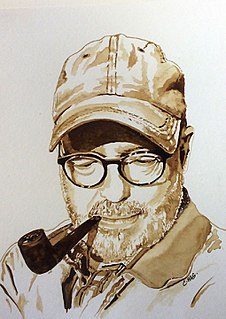A Quote by Martin Luther King, Jr.
The more I thought about human nature, the more I saw how our tragic inclination for sin/mistakes causes us to use our minds to rationalize our action.
Related Quotes
I also came to see that liberalism's superficial optimism concerning human nature caused it to overlook the fact that reason is darkened by sin. The more I thought about human nature the more I saw how our tragic inclination for sin causes us to use our minds to rationalize our actions. Liberalism failed to see that reason by itself is little more than an instrument to justify man's defensive ways of thinking. Reason, devoid of the purifying power of faith, can never free itself from distortions and rationalizations.
Every person in the world is by nature a slave to sin. The world, by nature, is held in sin's grip. What a shock to our complacency- that everything of us by nature belongs to sin. Our silences belong to sin, our omissions belong to sin, our talents belong to sin, our actions belong to sin. Every facet of our personalities belong to sin; it own us and dominates us. We are its servants.
Our first problem is that our attitude towards sin is more self-centred than God-centred. We are more concerned about our own "Victory" over sin than we are about the fact that our sin grieve the heart of God. We cannot tolerate failure in our struggle with sin chiefly because we are success oriented, not because we know it is offensive to God.
The mind is very wild. The human experience is full of unpredictability and paradox, joys and sorrows, successes and failures. We can't escape any of these experiences in the vast terrain of our existence. It is part of what makes life grand-and it is also why our minds take us on such a crazy ride. If we can train ourselves through meditation to be more open and more accepting toward the wild arc of our experience, if we can lean into the difficulties of life and the ride of our minds, we can become more settled and relaxed amid whatever life brings us.
Too much apparatus, designed to guide us in experiments and to supplement the exactness of our senses, makes us neglect to use those senses...The more ingenious our apparatus, the coarser and more unskillful are our senses. We surround ourselves with tools and fail to use those which nature has provided every one of us.
One problem with our current society is that we have an attitude towards education as if it is there to simply make you more clever, make you more ingenious... Even though our society does not emphasize this, the most important use of knowledge and education is to help us understand the importance of engaging in more wholesome actions and bringing about discipline within our minds. The proper utilization of our intelligence and knowledge is to effect changes from within to develop a good heart.
God gave us minds to think with and hearts to thank with. Instead we use our hearts to think about the world as we would like it to have been, and we use our minds to come up with rationalizations for our ingratitude. We are a murmuring, discontented, unhappy, ungrateful people. And because we think we want salvation from our discontents.
When we really want to hear, and be heard by, someone we love, we do not go rushing into noisy crowds. Silence is a form of intimacy. That's how we experience it with our friends and lovers. As relationships grow deeper and more intimate, we spend more and more quiet time alone with our lover. We talk in low tones about the things that matter... That is why Christ comes to us when our hearts and minds are still and silent.
God uses suffering to purge sin from our lives, strengthen our commitment to Him, force us to depend on grace, bind us together with other believers, produce discernment, foster sensitivity, discipline our minds, spend our time wisely, stretch our hope, cause us to know Christ better, make us long for truth, lead us to repentance of sin, teach us to give thanks in time of sorrow, increase faith, and strengthen character.
Let us serve Him faithfully as our Master. Let us obey Him loyally as our King. Let us study His teachings as our Prophet. Let us work diligently after Him as our Example. Let us look anxiously for Him as our coming redeemer of body as well as soul. But above all let us prize Him as our Sacrifice, and rest our whole weight on His death as atonement for sin. Let His blood be more precious in our eyes every year we live. Whatever else we glory in about Christ, let us glory above all things in His cross.
It is part of our human nature to want to be liked. It is part of our human nature to worry about what others think of us. It is an attribute of greatness and of American exceptionalism to not surrender to our nature, but to be guided by an inner calling to persevere and to prevail, no matter the personal cost.








































